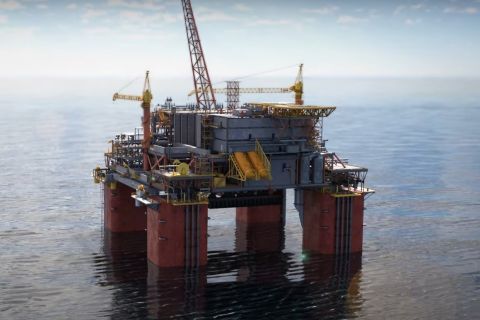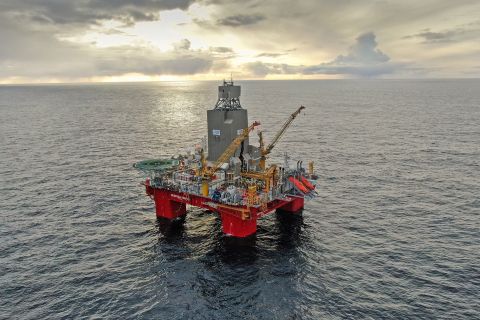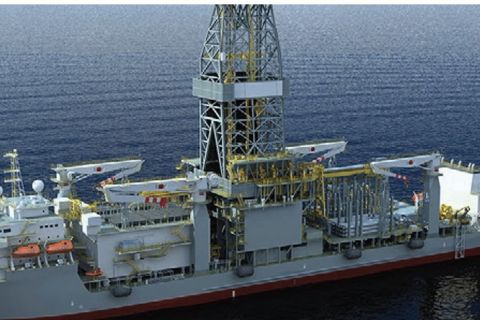Jordan Soto, executive producer, Hart Energy: I'm Jordan Soto here at OTC with another Hart Energy LIVE exclusive.
Joe Bussenger, director of launch operations, Relativity Space: Relativity Space is a rocket company. A couple weeks ago we flew our first vehicle, Terran 1, which was the first 3D printed rocket to ever go to space. So we're working right now on our next generation vehicle, which we'll be able to fly satellites that are a little bit bigger, as well as be reused by landing offshore, which is why I'm here today.
JS: Now you talk about these payloads and satellites that you're deploying with your 3D printed rockets, which is just incredible to even think about. How did the partnership of you guys and ABS kind of come to be and what's your goal?
JB: Yeah, so I would say you know, I've been in the industry for a long time now working on some of the first projects that saw rockets offshore, and the fun part was going to ABS, going to the Coast Guard and saying, ‘we want to do this.’ And them going, ‘wait, what?’ and then really figuring out how we fit in the regulations, how do we do things safely? And it's pretty exciting today that ABS has put out their new spaceport guide because it finally gives a company like mine who is just really starting to look at reusability and designing vessels that can land rockets. It gives us a guidebook to operate off of so that we don't have to learn the lessons learned. You know, there's no gray areas, it's very black and white. So pretty excited to see that come out today and really looking forward to working with ABS in the future on it.
JS: Now, in regards to the satellites that you guys are deploying, what's the tie in to offshore there?
JB: Yeah, so I think just a minor one, but a really big impact to the entire maritime force is just satellite internet. If you look at 10 years ago, your ability to use satellite internet was almost none on a ship. And now given some new technologies, and not only the satellites, but also the ability to fly them at a quick rate, now you can basically FaceTime with your family at 1080p and everyone on the ship can do it. So that's just like one small area, but definitely one of the biggest impacts to Mariner morale and really, safety offshore.
JS: And I think another part of that too is, as the energy and industry automates itself, this is going to be a key component of that because if you can't access internet, then you can't really automate from shore to offshore. And so that's a really big component of that. So we're really excited to see what you guys have to do next.
And I have one last question for you here. So space and the energy industry. Where's the cross between, where's the connect and what do you see that impact of connection?
JB: Yeah, I think the biggest thing is, a lot of people look at the two industries and they go, ‘yeah, how are they connected?’ And they're connected in a lot of ways than a lot of people think. You know, you talk about autonomy and using satellite internet. Well, a lot of maritime companies and oil and gas companies are, ‘okay, well how do we do this from a control room standpoint?’ And, you know, control rooms are something that the aerospace companies have been really good at for decades and decades. So I think really it's just showing each other the problems that have been solved in each industry and being able to provide those solutions and really just working together on those partnerships moving forward.
So that's really why I'm here today. It's been exciting to see some of the problems I'm personally working on in the aerospace industry solved here and being able to share some of those ideas with the folks that solved them and seeing if I might be able to offer some help as well.
JS: Well, thank you so much for your time, Joe. To learn more about Relativity Space, go online to hartenergy.com.
Recommended Reading
CNOOC Makes 100 MMton Oilfield Discovery in Bohai Sea
2024-03-18 - CNOOC said the Qinhuangdao 27-3 oilfield has been tested to produce approximately 742 bbl/d of oil from a single well.
CNOOC Finds Light Crude at Kaiping South Field
2024-03-07 - The deepwater Kaiping South Field in the South China Sea holds at least 100 MMtons of oil equivalent.
Deepwater Roundup 2024: Offshore Australasia, Surrounding Areas
2024-04-09 - Projects in Australia and Asia are progressing in part two of Hart Energy's 2024 Deepwater Roundup. Deepwater projects in Vietnam and Australia look to yield high reserves, while a project offshore Malaysia looks to will be developed by an solar panel powered FPSO.
Vår Energi Hits Oil with Ringhorne North
2024-04-17 - Vår Energi’s North Sea discovery de-risks drilling prospects in the area and could be tied back to Balder area infrastructure.
Valaris Updates Fleet Status
2024-02-19 - The backlog of these contracts and extensions is valued at $1.2 billion.





